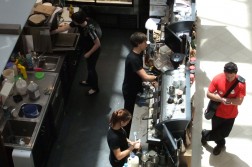Prelude to the conference
One of the things that I’ve learnt in the three months leading up to Copenhagen is how arbitrarily the Liberal Party will destroy good policy, purely to suit their short-term objectives. The National Party supporting sensible policy is about as likely as Warren Truss opening a gay dance club with a hemp product co-operative out the back. That’s fine, but I did expect the Libs to back the CPRS due to its perfect balance between saving the world’s environment and ensuring jobs are protected (colloquially titled "comparative amelioration" in the policy). Tony Abbott is a climate sexist: he believes the Earth is just perspiring a little when in fact it’s a hirsute, obese menopausal woman with a swine flu induced fever. My point? A good outcome at Copenhagen is crucial in order to be able to come back and put a blowtorch to Tony Abbott’s Speedo-crushed testicles over the need for a CPRS.
Day 1
On arrival, the sheer scale of the task facing delegates becomes apparent. It’s hard to imagine this many people getting decent food, rooms and transport each and every day. If we aren’t looked after, then how can we look after the rest of the world? World-changing decisions aren’t made on an unsatisfied stomach: just ask Winston Churchill.
Aside from catering challenges, there’s the daunting political reality of getting so many countries to agree. Not surprisingly, the larger economies have different agendas to the small island nations staring down the barrel of enforced waterbeds in every house. On top of that, you have the large third-world economies (India, Indonesia and the United States) versus the economic superpowers (China and Western Australia), with each bloc having very different perspectives on how best to manage climate change. The only light I can see is the negotiating abilities of those of us with both environmental credibility and the political clout to create what I call "forced consensus" — essentially, the G77 need to fall in line and realise the G20 are more than capable of determining their welfare.
Day 2
Today was looking like a war of attrition where the trenches are the geographic groupings of delegates, and the trench-foot the protesters outside thinking they’re making a difference. The game was changed with the leaking of what’s now called the "Danish text", a draft of a final agreement nutted out by the Danish PM and a "circle of commitment" which included Kevin Rudd. Not surprisingly, Kevin asked me to write the bulk of the Australian contribution, and from an objective viewpoint it’s a substantive, rigorous effort worthy of international praise and outright adoption.
Days 3–7
Groundhog Days from hell: US or Chinese negotiators call a meeting with me to ensure backing for their proposed targets. Then, the G77 nations ask my staff if I can meet with them so they can ensure I’m backing their desire to not drown. I then attempt to get them all in the same room together, but usually by then it’s lunch-time and the momentum is lost as we move to our respective dining areas (G20 in main dining suite, G77 in the staff cafeteria and the rest to Subway). Same process starts in the afternoon and suddenly it’s dinner time.
A really predictable aspect of the negotiations is the walk-out. There’s been a few dozen to date and they are now factored in to the negotiation timeframes, with lunch and dinner moved back 30 minutes.
Day 8
The media tend to get excited about the arrival of each country’s leaders to the summit, in the notion that the addition of 80–100 more suits will provide the perfect circuit-breaker for any deadlocks that have occurred. The reality is more like the head of Australia’s Armed Forces doing a base inspection: the plebs and the officers perform their expected roles for a few hours and then get back to their usual modus operandi of being mates, hazing each other and generally arseing about like they do on It Ain’t Half Hot Mum. The past week has seen some semi-real progress towards an agreement that no number of pontificating leaders is going to change. And for the Obama fans out there: he’ll do the pretty speech while the rest of the delegates clench their sphincters, knowing the US have no credibility in this area. I’ve also spoken to at least a dozen delegates who’ve mixed him up with Tiger Woods and now think he’s an adulterer in semi-retirement.
Day 9
Kevin’s arrived and he’s determined as always to be the game changer. I sat in on his strategy session with his staff and he certainly made it clear that a bunch of them would be demonstrating their environmental credentials by swimming home if they didn’t put in the level of effort required. Jointly we’ve played down expectations of an agreement. The cynics say it’s to ensure we don’t come home with egg on our face. The real reason is in fact related to eggs: the meals have remained abominable, hence the total loss of momentum to a substantial agreement. That won’t stop the media running furphies around self-interest, lobby groups and widespread incompetence. Bastards.
Days 10–13
As predicted, the summit hasn’t come to a climax, more a stale fart. The agreement to talk more in the future is a little like agreeing that Bob Brown is a carping arseclown — it’s obvious but it’s not going to achieve anything useful. I’m not going to waste words writing about the behaviour of countries like Venezuela on the last day of the conference. They were the equivalent of Joh’s attendance at premiers’ conferences in the mid-80s — largely unhinged and desperate for attention.
The presentation of little Lego mementos at the final session summed up the conference perfectly for me: blocks, colour and toxic gases. The only consolation is that Kevin and I put our hearts and souls into getting a deal that was right for Australia. Unfortunately, that wasn’t enough to get much more than some plastic window dressing from the countries present. I particularly feel sorry for our fuzzy-wuzzy neighbours who’ll be refused entry to Australia when the waters keep on rising. It doesn’t seem fair that we’ll cop flak for refusing entry to these people from the same countries who couldn’t agree on targets that would have prevented them trying to come here in the first place.
Summary
The importance of these past few days cannot be overstated. At the very least it’s as important as the Magna Carta or the opening of New Parliament House, and in a lot of ways it far outweighs events like those — given they didn’t have flow-on effects for decades afterwards. The lack of a binding agreement is disappointing, but it also provides a challenge that the Rudd Government won’t be shirking. We’ve already made approaches to the UN to add another climate conference prior to the one scheduled for Mexico City next year. We’ve offered Hobart as a venue for its green credentials, excellent facilities and surety of quantity and quality of food. Who the hell’s going to negotiate a world-changing deal in Mexico City? I spent a week there once and lost seven kilograms, and it sure as hell wasn’t from jogging. Plus, it will be fun to watch Tony Abbott argue that Hobart should miss out on hosting its biggest event ever. When good strategic thinking happens to deliver superior political outcomes, the hardship of the past few weeks recedes. Until the next warm prawn cocktail arrives.
Donate To New Matilda
New Matilda is a small, independent media outlet. We survive through reader contributions, and never losing a lawsuit. If you got something from this article, giving something back helps us to continue speaking truth to power. Every little bit counts.



